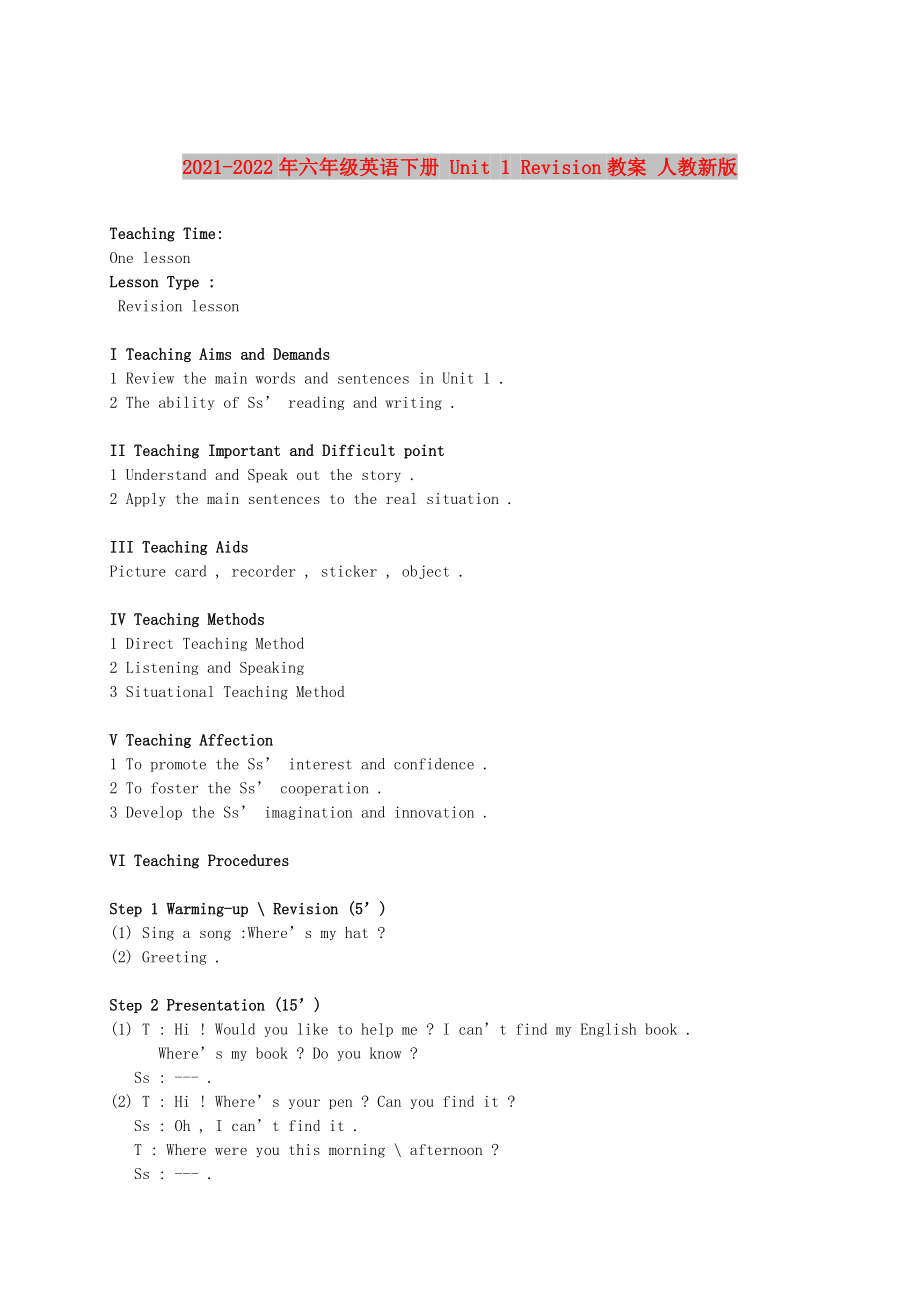《2021-2022年六年級(jí)英語(yǔ)下冊(cè) Unit 1 Revision教案 人教新版》由會(huì)員分享��,可在線閱讀,更多相關(guān)《2021-2022年六年級(jí)英語(yǔ)下冊(cè) Unit 1 Revision教案 人教新版(3頁(yè)珍藏版)》請(qǐng)?jiān)谘b配圖網(wǎng)上搜索�。
1���、2021-2022年六年級(jí)英語(yǔ)下冊(cè) Unit 1 Revision教案 人教新版
Teaching Time:
One lesson
Lesson Type :
Revision lesson
I Teaching Aims and Demands
1 Review the main words and sentences in Unit 1 .
2 The ability of Ss’ reading and writing .
II Teaching Important and Difficult point
1 Understand and Speak out
2��、 the story .
2 Apply the main sentences to the real situation .
III Teaching Aids
Picture card , recorder , sticker , object .
IV Teaching Methods
1 Direct Teaching Method
2 Listening and Speaking
3 Situational Teaching Method
V Teaching Affection
1 To promote the Ss’ interest and con
3、fidence .
2 To foster the Ss’ cooperation .
3 Develop the Ss’ imagination and innovation .
VI Teaching Procedures
Step 1 Warming-up \ Revision (5’)
(1) Sing a song :Where’s my hat ?
(2) Greeting .
Step 2 Presentation (15’)
(1) T : Hi ! Would you like to help me ? I can’t find my Englis
4��、h book .
Where’s my book ? Do you know ?
Ss : --- .
(2) T : Hi ! Where’s your pen ? Can you find it ?
Ss : Oh , I can’t find it .
T : Where were you this morning \ afternoon ?
Ss : --- .
T : where did you go then ? Ss : --- .
T : Look , here it is . You can take care of your things
5、 . You are good boy !
(3) Listen to the story and answer the questions :
Can Micky take care of his things ? Why ?
(4) Read the story and answer the questions in your group :
Where is Micky’s key ? Where was Micky this morning \afternoon ?
Where did Mick go then ?
Step 3 Practice (10’)
6�、
Act the story .
Step 4 Assessment (10’)
Read Story to your group leader .
VII The Blackboard Design
Unit 1 Revision
A : Where’s my key ?
B : Where were you this morning \ afternoon ? Where did you go then ?
I was in the --- .
VIII Back Courting
附送:
2021-2022年六年級(jí)英語(yǔ)下冊(cè) Unit 1(1)教學(xué)反思 蘇
7���、教牛津版
本單元的主要話題是兩種事物的比較�����。初次涉及到形容詞的比較級(jí),有人的比較�,也有物的比較��。在教學(xué)中��,我結(jié)合學(xué)生的生活實(shí)際����,引導(dǎo)學(xué)生比較年齡����、身高和體重等�,給學(xué)生創(chuàng)設(shè)一個(gè)“比較”的情景��,引出本單元的新授內(nèi)容��,并引導(dǎo)學(xué)生運(yùn)用于生活實(shí)際尋找比較的人和物���,逐步掌握形容詞的比較級(jí)。在具體的教學(xué)中�����,我是這樣做的:
首先,有“兒童立場(chǎng)”�,能根據(jù)學(xué)生的生活實(shí)際進(jìn)行教學(xué)設(shè)計(jì)��。由于本課涉及了形容詞的比較級(jí)�����,課前和備課組的老師進(jìn)行了多次討論�,決定從學(xué)生的生活實(shí)際(年齡、身高和體重)入手�,教師通過(guò)詢問(wèn)“How old are you?”了解學(xué)生的年齡���,很自然地進(jìn)行學(xué)生年齡的比較�,從而引出形容詞的比較級(jí)。
8�、這樣新課的導(dǎo)入自然順暢,降低了學(xué)習(xí)難度�,學(xué)生也比較感興趣,也樂(lè)于表達(dá)����。
其次、有結(jié)構(gòu)意識(shí)��,句型練習(xí)有層次性��。本單元主要圍繞兩個(gè)句型“Who’s taller than … ? … is.” “Whose … is bigger, A’s or B’s? A’s is.”展開�。在教學(xué)句型“Who’s taller than … ? … is.”時(shí)��,我制作了一張表格用于調(diào)查學(xué)生的年齡���、身高和體重�,如下表:
Helen
Age
Height
Weight
利用表格調(diào)查學(xué)生的信息��,引導(dǎo)學(xué)生用陳述
9��、句表達(dá)“…is taller than …”�,初步理解than的含義,并嘗試運(yùn)用比較級(jí)��,再過(guò)渡到疑問(wèn)句式���,給學(xué)生以一定的坡度來(lái)掌握這一新的句式�。從陳述句到疑問(wèn)句�,再?gòu)囊蓡?wèn)句到用幾句話來(lái)描述自己的朋友,讓同學(xué)從自己的描述中猜測(cè)朋友是誰(shuí)�,逐步增加難度,使得句型的學(xué)習(xí)和運(yùn)用有一定的層次性�,符合學(xué)生的認(rèn)知規(guī)律。
抓住差異資源生成新的語(yǔ)言�。在教學(xué)設(shè)計(jì)時(shí),只考慮到本單元的重點(diǎn)內(nèi)容是形容詞的比較級(jí)�,都是運(yùn)用“than”去幫助學(xué)生來(lái)比較。但在教學(xué)時(shí)���,出現(xiàn)了學(xué)生年齡�、身高和體重相同的情況�,我就把原先打算放在課文中學(xué)習(xí)的句式“… is as … as …”提前進(jìn)行了教學(xué),為學(xué)生提供了比較的不同表達(dá)方式。
學(xué)生
10��、能很好的運(yùn)用所學(xué)知識(shí)來(lái)描述人物的不同和相同之處����,總體寫得不錯(cuò),但是許多學(xué)生對(duì)自己所寫句子的細(xì)節(jié)不夠關(guān)注��,錯(cuò)誤較多��,也反映出學(xué)生平時(shí)對(duì)知識(shí)點(diǎn)的積累不夠重視���,在具體運(yùn)用時(shí)錯(cuò)誤就暴露了出來(lái)�,下面是學(xué)生的具體錯(cuò)誤歸納:
1.He’s eyes is smaller than her.正確的應(yīng)是:His eyes are smaller than hers.學(xué)生對(duì)形容詞性物主代詞和名詞性物主代詞不會(huì)正確使用��。單復(fù)數(shù)概念不清晰,具體運(yùn)用就出錯(cuò)�。
2.My mother eyes are bigger then my father. 正確的應(yīng)是:My mother’s eyes are bigger t
11��、han my father’s.對(duì)于名詞所有格的表達(dá)尚不會(huì)���,不知道加’s.其實(shí)上學(xué)期一直強(qiáng)調(diào),學(xué)生之所以不會(huì)運(yùn)用�,是沒(méi)有表達(dá)的機(jī)會(huì)��,等到要用時(shí),根本不會(huì)��。單詞than與then發(fā)音相近,學(xué)生還是習(xí)慣性的使用了原來(lái)的單詞����。
3.Like fatter than me. I’m eyes bigger than like. 正確的應(yīng)是:Like is fatter than me. My eyes are bigger than Like’s.整個(gè)句子都沒(méi)有be動(dòng)詞�,沒(méi)有用形容詞性物主代詞來(lái)修飾名詞,而是習(xí)慣性的用I’m.
對(duì)于以上的錯(cuò)誤給學(xué)生及時(shí)正確的指導(dǎo)�,同時(shí)讓學(xué)生重新給自己喜歡的人物進(jìn)行描寫。相信有了良好的開端����,就有良好的延續(xù)��。
當(dāng)然�����,在教學(xué)中還感到很多不足和遺憾,還需要不但地改進(jìn)和提高�����。比如:在本單元的教學(xué)中,還缺少一個(gè)大的語(yǔ)言情景�。新基礎(chǔ)的英語(yǔ)教學(xué)要求每節(jié)課給學(xué)生創(chuàng)設(shè)一個(gè)大的語(yǔ)言情景�,尋找一個(gè)主題。在教學(xué)設(shè)計(jì)時(shí)�����,我們備課組也一直在討論給學(xué)生提供一個(gè)什么樣的主題,但是一直沒(méi)有找到合適的主題�����,最后我們只能把“比較級(jí)”這一概念作為本節(jié)課的主題��。在句型教學(xué)中��,這種螺旋上升過(guò)程體現(xiàn)的還不夠。這都是我在以后的教學(xué)中要不斷學(xué)習(xí)和改進(jìn)的地方�。
 2021-2022年六年級(jí)英語(yǔ)下冊(cè) Unit 1 Revision教案 人教新版
2021-2022年六年級(jí)英語(yǔ)下冊(cè) Unit 1 Revision教案 人教新版

